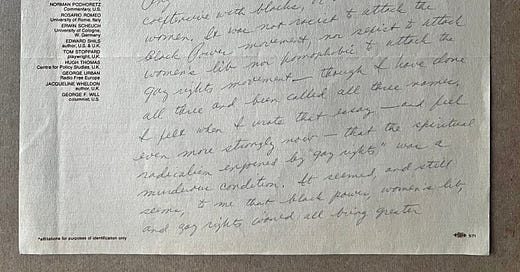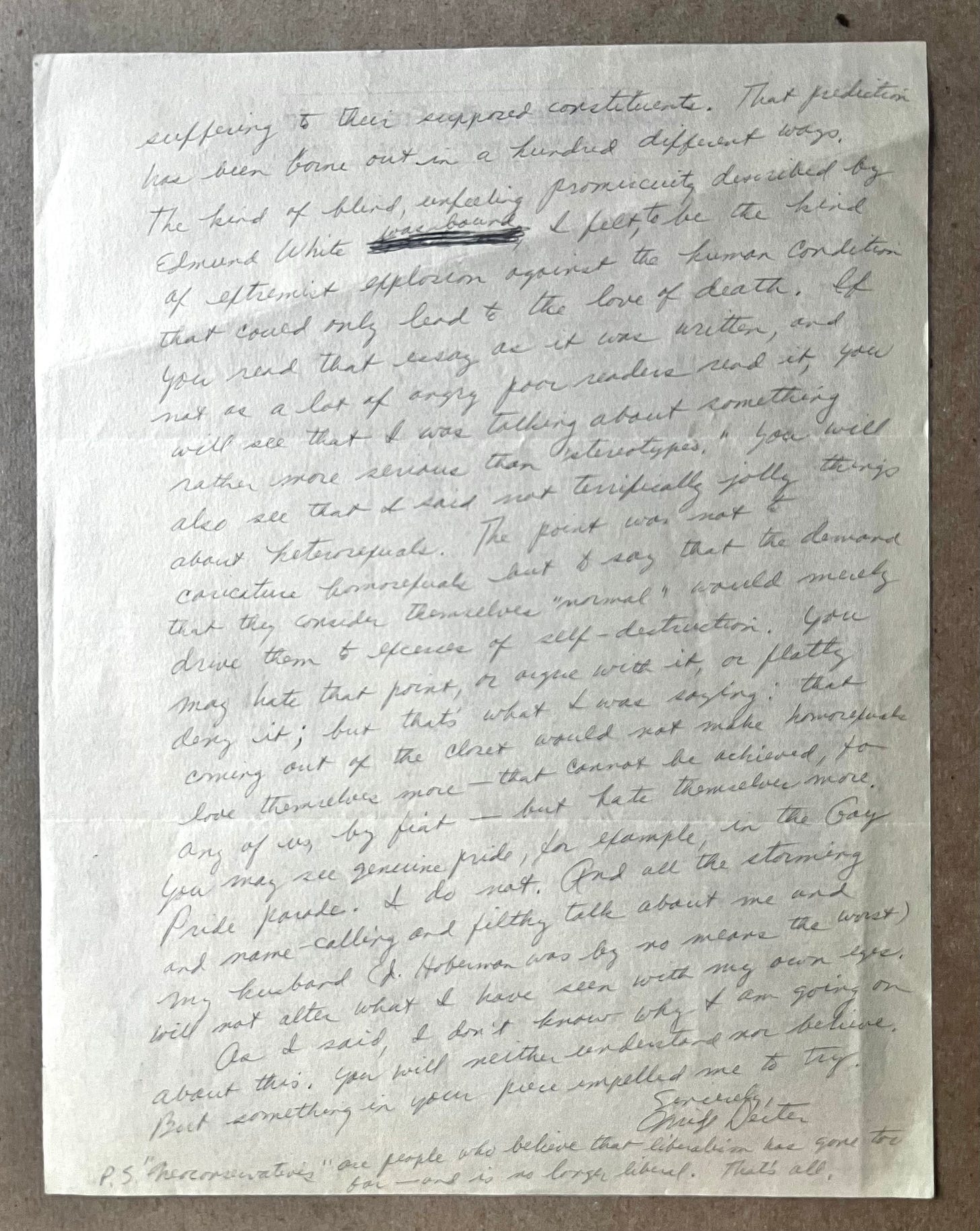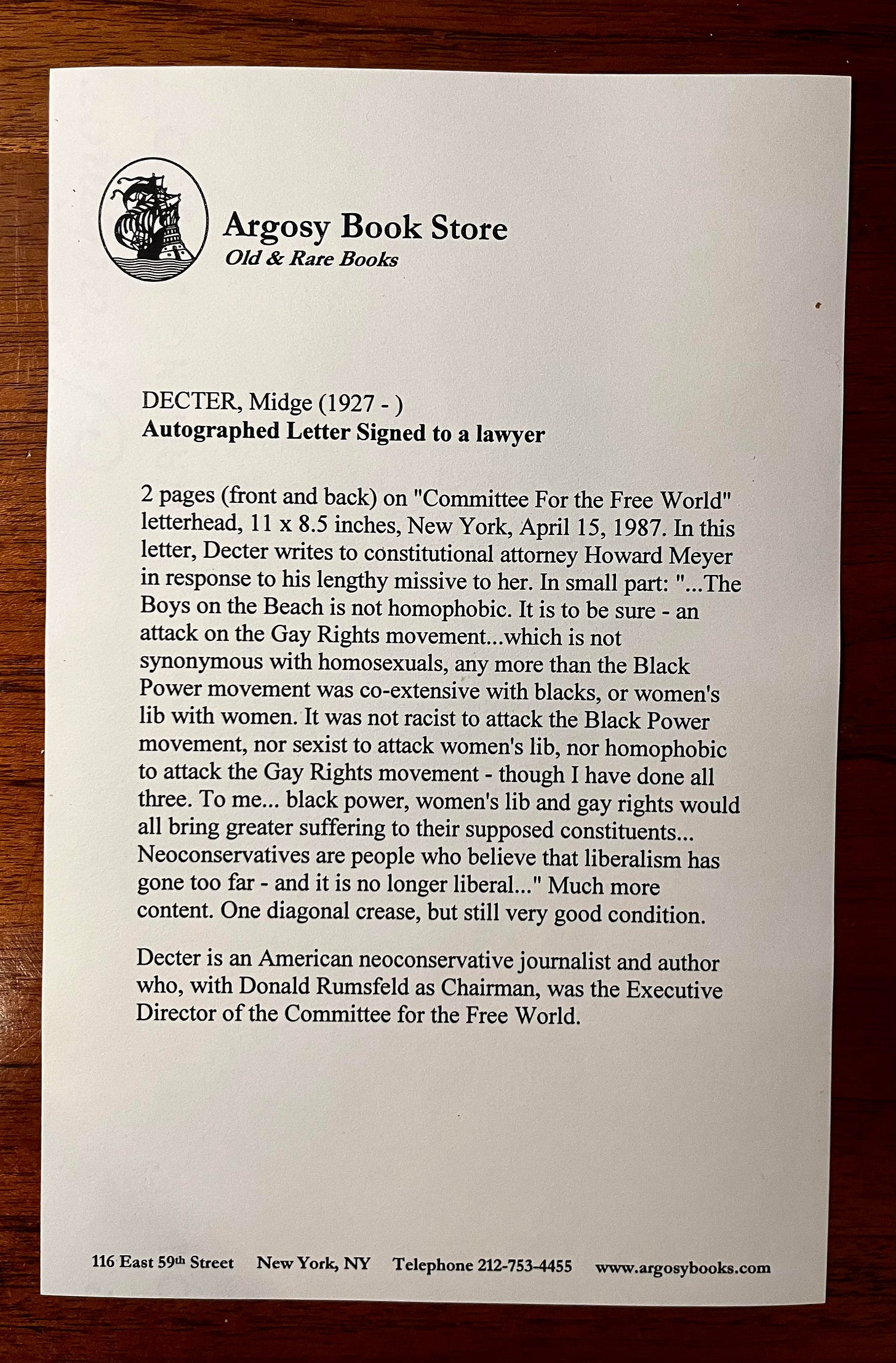Midge Decter to Howard Meyer, April 15, 1987
A revealing private letter from a public intellectual.
When I began Friends and Enemies, I promised a series, “Personal Archives,” that would be published Monday mornings and draw from my personal library and private collection of rare, first edition, or simply beautiful books, and, occasionally, letters and other literary ephemera. This is the first installment, and, admittedly, an unusually rich one. Currently, I’m traveling in Rome, and I took the photos used here around the time I acquired this letter—they’re certainly clear enough to read, and what I used to transcribe it, but I will be considering the best way to photograph and present these items going forward.
This week, the Know Your Enemy team will be interviewing University of Oklahoma history professor Ronnie Grinberg about her new book, Write Like a Man: Jewish Masculinity and the New York Intellectuals, just out from Princeton University Press. One of those intellectuals was Midge Decter (1927-2022), the “first lady of neoconservatism,” foe of feminists, affirmative action, and the gay-rights movement, in addition to being an editor, rightwing institution-builder, and (frankly, a rather good) writer. I’ve long been fascinated by Decter, and if you’d like an excellent introduction—if I may say so—to her life and work, I highly recommend the conversation I had with my beloved co-host Sam Adler-Bell and brilliant friends Moira Donegan and Adrian Daub on Know Your Enemy, “Midge Decter: Anti-Feminist Cold Warrior.”
The letter from Decter (both images and a transcription of the letter can be found below) is one of the jewels of my collection. It’s got it all: handwritten on Committee for the Free World letterhead, a number of provocative (to say the least) arguments and assertions, and even an unfavorable reference to my favorite living gay novelist, Edmund White. What made Decter go on for two full pages in response to a lawyer she seemingly had no prior relationship to, personally or professionally?
In 1980 Decter had published an infamous article in the flagship magazine of Reagan-era neoconservatism, Commentary, drawn from her time vacationing on Fire Island—now best known as a “gay friendly tourist location,” but in decades past a refuge for bohemians of all stripes—titled “The Boys on the Beach.” She was, to say the least, highly critical of what she saw there among, or perhaps even more between, the gay men who were starting to come out of the closet, and she offered her unvarnished judgments on these supposed horrors. It provoked outraged responses, most acerbically (among other things) from Gore Vidal in The Nation, who wrote an essay initially titled “Some Jews and the Gays” and later repackaged as “Pink Triangle and Yellow Star.”
For reasons lost to history, years later, in 1987, a lawyer named Howard Meyer wrote to Decter, apparently quite critically, about her essay. I’ve been unable to find his letter, but Decter’s response has survived, and I’ve transcribed it below, where you can also see images of the original. My understanding is that Decter has not donated her letters, papers, or “archives” to a university library or similar institution, so this almost certainly is one of the most substantive letters of hers available. I’ve kept the slight, occasional inconsistencies in her handwriting (for example, Black Power vs. black power), used all caps for underlined words and phrases, and, in one case, included two m-dashes for a name I couldn’t decipher. (It appears to me as “J. Haberman,” but I wasn’t sure; feel free to offer your interpretation in the comments or in a message to me.) Please be warned: her language gets nasty in a few places. After the transcription, I provide the details of how I acquired the letter.
Dear Mr. Meyer,
Thank you for sending me your piece, which I read with interest. I cannot, of course, attempt to “answer” all the points you made because to do so would require a piece as long as your own. But for some reason -- I know it will not help -- I wish to clarify one point. “The Boys on the Beach” is NOT homophobic. It is, to be sure, an attack on the gay-rights movement, which is neither coextensive with, nor synonymous with, homosexuals, any more than the Black Power movement was coextensive with blacks, or women’s lib with women. It was not racist to attack the Black Power movement, nor sexist to attack women’s lib, nor homophobic to attack the gay rights movement — though I have done all three and been called all three names. I felt when I wrote that essay — and feel even more strongly now — that the spiritual radicalism enjoined by “gay rights” was a murderous condition. It seemed, and still seems, to me that black power, women’s lib, and gay rights would all bring greater suffering to their supposed constituents. That prediction has been borne out in a hundred different ways. The kind of blind, unfeeling promiscuity described by Edmund White was bound, I felt, to be the kind of extremist explosion against the human condition that could only lead to the love of death. If you read that essay as it was written, and not as a lot of angry poor readers read it, you will see that I was talking about something rather more serious than “stereotypes.” You will also see that I said not terrifically jolly things about heterosexuals. The point was not to caricature homosexuals but to say that the demand that they consider themselves “normal” would merely lead them to excesses of self-destruction. You may hate that point, or argue with it, or flatly deny it; but that’s what I was saying: that coming out of the closet would not make homosexuals love themselves more — that cannot be achieved, for any of us, by fiat — but hate themselves more. You may see genuine pride, for example, in the Gay Pride parade. I do not. And all the storming and name-calling and filthy talk about my husband (—— was by no means the worst) will not alter what I have seen with my own eyes.
As I said, I don’t know why I am going on about this; you will neither understand nor believe. But something in your piece compelled me to try.
Sincerely,
Midge Decter
P.S. “Neoconservatives” are people who believe that liberalism has gone too far — and is no longer liberal. That’s all.
I bought the letter from Midge Decter featured in today’s Personal Archives from the great Argosy Book Store on the Upper East Side. (If you’re interested, about a decade ago the New Yorker profiled the three sisters who still own and operate the bookshop.) The above card contains all the information that was provided to me at the time of purchase. Argosy has a wonderful collection of rare books, autographs, letters, etc, and they sometimes handle the library part of an estate sale, which is, I suspect, how this item ended up in their hands—though I could be wrong, and I welcome input from readers about the circumstances around this letter.







I’m guessing your mystery man is the Village Voice writer J. Hoberman…
I wonder if the lawyer named Howard Meyer, whom the Argosy card describes as a “constitutional attorney”, is Howard N. Meyer. He wrote a book on the 14th Amendment in the 1970s and had been a Special Assistant to US Attorney General Francis Biddle (who held that position during WWII).
Source: https://journals.sagepub.com/doi/abs/10.1177/0967010693024002016